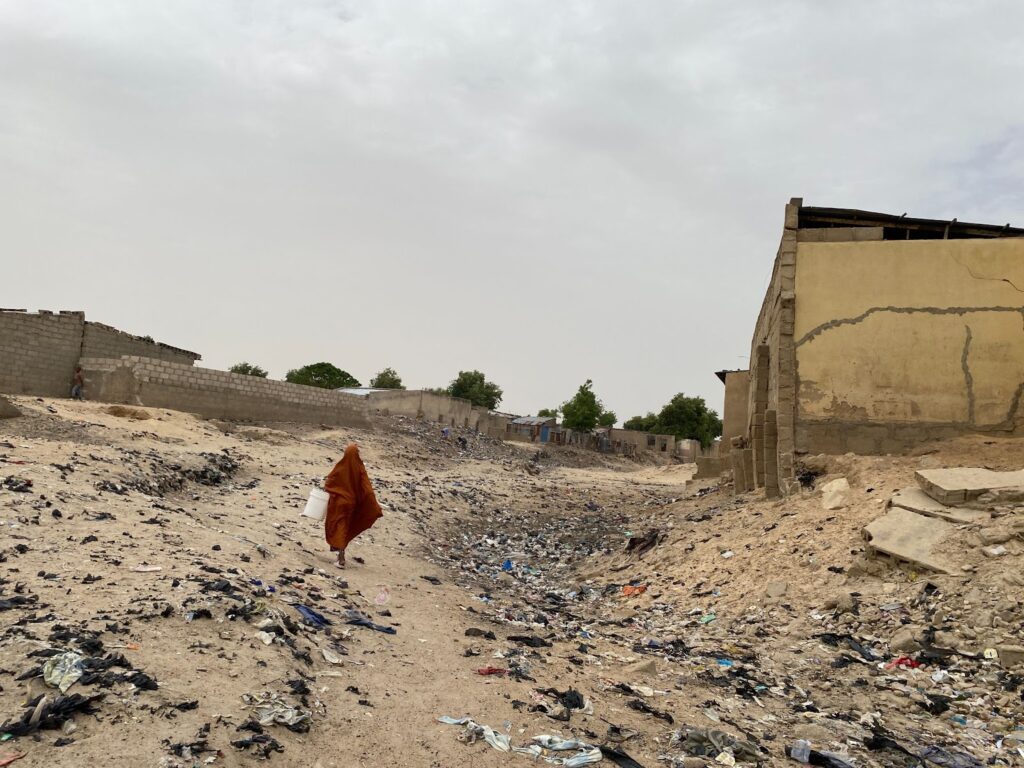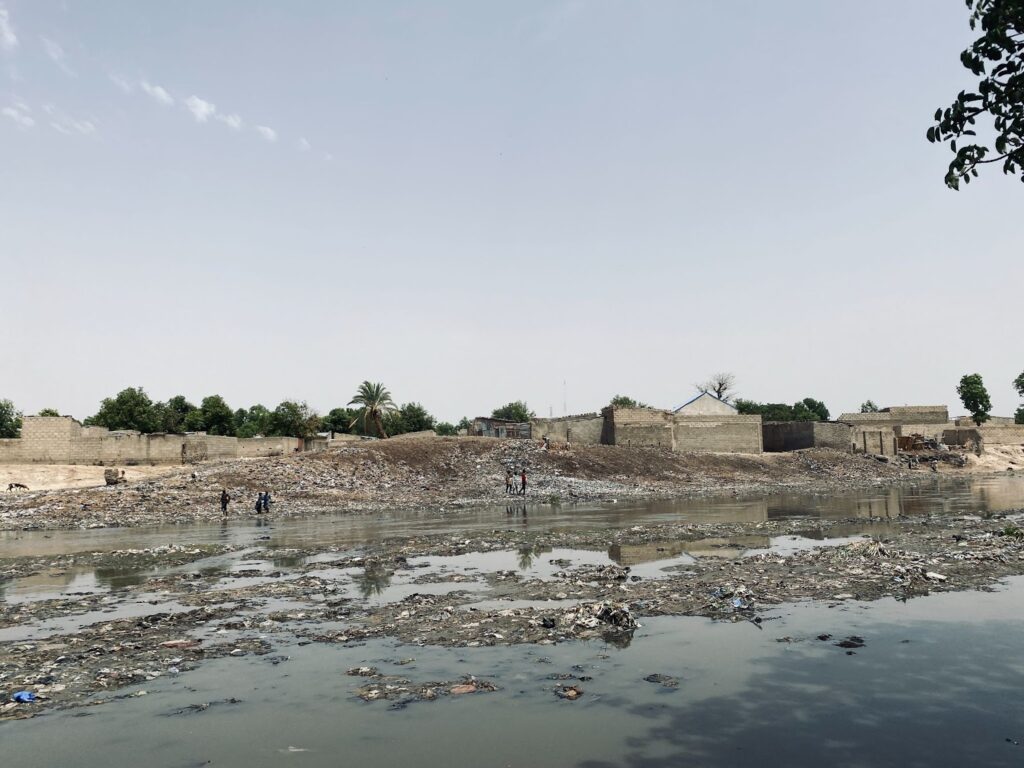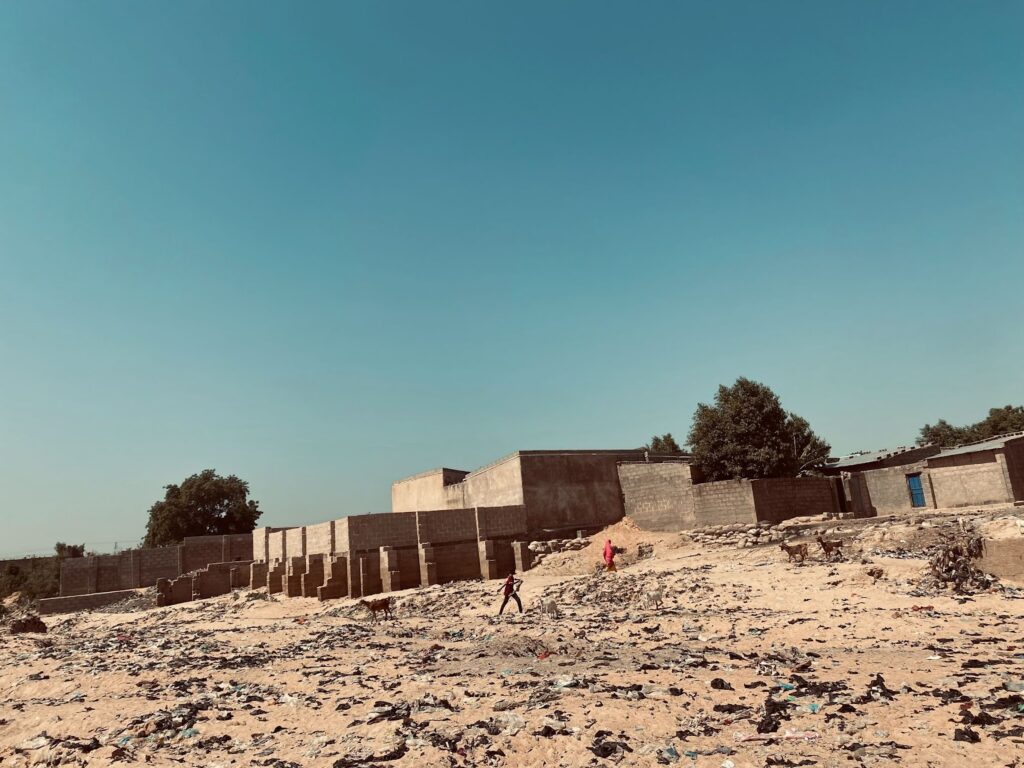Living On The Edge: Stories From A Flood Prone Area In Northeast Nigeria
In communities like Moduganari, residents face a recurring battle against the devastating effects of annual floods. What is life like for those living in these flood-vulnerable locations, and how do they cope with the constant threat?
Twenty-twenty-two is etched in Zara Mohammed’s memory as a year of relentless hardship.
Along with other families, the 27-year-old mother of five was displaced by the Boko Haram insurgency years ago and found refuge in the Moduganari Tsallake area of Maiduguri, northeastern Nigeria. The area has become both a sanctuary and a source of new struggles.
As the rain pounded her tin roof that year, Zara clutched her children, “her heart racing with each crash of thunder.”
Their home, situated along the waterway, experiences severe flooding during heavy rains.
Nigeria’s 2024 Annual Flood Outlook (AFO) has identified several states, including Borno, Taraba, and Yobe, as high flood-risk areas. This forecast highlighted the urgent need for proactive measures to mitigate potential flood impacts. However, Borno State has not faced the reality of flooding for the first time.
Zara once lived in a modest home filled with memories and hard-earned belongings in the Kaga Local Government Area of Borno state. That life was violently disrupted when Boko Haram insurgents burned her home, forcing her family into displacement.
For the last six years, they have lived in this riverside community, battling a new set of adversities. Zara recounts how the little they owned was often swept away or buried by heavy rains, with even their toilets disappearing in the deluge.
“One moment we are safe, another moment we are rushing to move out, praying for help,” she says, the fear still palpable in her voice
Many residents of communities like Moduganari, which has a history of heavy flooding, battle the effects of this disaster year in and out. So, what is life like for those living in such flood-vulnerable locations, and how do they cope with the constant threat?
The struggle extends beyond just keeping dry.

Finding enough food and water has been a daily challenge. “Sometimes we starve because, even if we have money, the stagnant water makes it impossible to go out and buy what we need,” Zara recalls. Her story is one of survival, a testament to the resilience of those who continue to fight for a semblance of normalcy amidst the chaos.
Caught in the Deluge: Muktar Goni Ali’s Story
Muktar Goni Ali’s life has been a tale of perseverance in the face of adversity. On a modest income, he bought a piece of land in this flood-prone area and built his own house.
For 17 years, he has called this place home, but with each passing year, the situation has worsened. Two years ago, while working on the farm, Muktar received a devastating call. His house had been destroyed by flooding. Rushing home, he found that his wife and children had already fled to a safer location. Desperate to salvage what he could, Muktar nearly drowned in the attempt. In the end, he escaped with nothing but his life.
The area is home to many internally displaced persons, all of whom struggle to find affordable, safe housing. For Muktar and his neighbours, relocating isn’t an option; they simply can’t afford it.
He stressed that the government has a responsibility to intervene and construct a bridge, providing a secure crossing point and ensuring the community’s safety from constant flood threats.
A life defined by floods: Mustapha Mohammed’s story
Mustapha Mohammed has called this place home for 20 years. It’s where he grew up and raised his family, not out of choice but because circumstances have bound him to this land.
Life here is fraught with difficulties, especially during the rainy season. Each year, Mustapha and his family brace themselves for the challenges the rains bring.
“When the rains begin, my children are trapped,” Mustapha explains. “They can’t go to school because the roads flood, turning our community into a series of dangerous, murky streams.”
The onset of the rainy season also ushers in diseases like malaria and cholera, along with the constant threat of scorpions and snakes. Floods are not just an inconvenience; they’re deadly.
“At least ten people die annually here due to the floods. During the last flood, I lost count of the number of deaths. It’s a heart-wrenching toll on our community,” Mustapha told HumAngle.

Now, with the rainy season already setting in, Mustapha makes another desperate appeal: “You’ve seen the state of our community. We desperately need a bridge, something that will allow us to continue our lives without the constant fear of the floods.”
A bridge would mean their children could go to school safely, and they could navigate their daily lives without peril. “We need your help to bring our plight to the government’s attention,” Mustapha urges.
Call for action
Urban flooding is a critical issue globally, and the northeastern Nigerian state of Borno is no exception. In 2022, excessive rainfall caused the Ngadabul River to overflow, severely damaging numerous homes in the Moduganari and Gwange areas.
Dr Mustapha Adam Kolo, a lecturer in the Department of Geography at the University of Maiduguri, identified a significant cause of the flooding as houses built within the river’s floodplain. “When water comes, those houses will inevitably flood,” Dr. Kolo stated.
He explained that land along the floodplain is cheap, attracting buyers who often bypass the urban planning and development board’s permit process. Dr. Kolo also highlighted the inadequate drainage systems in Borno, which hinder the necessary interconnections from effectively managing excess water.
He called for stringent measures on development control and urged authorities to prohibit construction in flood-prone areas along the river.
Dr. Kolo proposed a solution to protect residents from flooding in Borno. He suggested designating the settlements in flood-prone areas as unauthorised and offering compensation packages to relocate residents to safer areas.
To illustrate the potential benefits, he compared the situation to the Thames River in London, a city in southwestern Ontario, Canada. The riverbanks are lined with trees, creating a natural flood barrier and a recreational zone for the city.
He argued that implementing a similar strategy of relocating residents and planting trees along Borno’s waterways could significantly reduce flood risks in the region.
Navigating urban development: Insights on Borno State’s building regulations
In the heart of Borno State, urban planning and development are governed by a stringent set of regulations.
Modu Usman Choromi, the former General Manager of the Borno State Urban Planning and Development Board, once at the forefront of flood mitigation efforts in Borno State, emphasized the crucial role of Law Number 27, enacted in 2001. This law mandates that all building projects undertaken by government and private individuals require prior official approval.
“According to the law, those wishing to embark on construction must present detailed building plans and title documents,” Choromi explained. “Our engineers meticulously review these submissions to ensure they meet established standards. Only after this thorough vetting process are building permits issued, allowing the applicant to proceed with construction.”
Failure to adhere to these procedures can have severe consequences. Buildings erected without proper authorisation are subject to sealing and potentially demolishing, if necessary. This strict enforcement is part of a broader strategy to maintain orderly urban development and mitigate risks, such as flooding.
Choromi addressed the specific issue of flood-prone areas like Moduganari, noting that a high-powered committee dedicated to demolishing structures along waterways already exists within the board. “During the previous administration, we conducted extensive reports and identified all the buildings that needed to be addressed along these vulnerable areas,” he recalls. “We even planned for compensation for affected residents, but the initiative faltered due to external pressures beyond our control.”
For now, the board’s stance is clear: existing structures in these flood-prone zones will remain untouched, but no new construction will be permitted. “We understand the hardships people are facing. We aim to explore viable solutions to improve the situation without exacerbating the risks,” he added.

Between June 1 and August 31, 2022, the International Organisation for Migration’s Displacement Tracking Matrix programme conducted thorough assessments to evaluate the extent of damage caused by heavy windstorms, rainfall, and flooding in IDP camps and host community sites in Nigeria’s northeastern states of Borno, Adamawa, and Yobe.
The assessments covered 72 host community locations, 11 camps, and nine collective settlements. The most severely affected area was Banki, in the Buduwa/Bula Chirabe ward of Bama LGA, where a combination of heavy rainfall and the opening of dam gates in Cameroon led to flooding that impacted an estimated 7,389 individuals.
Overall, 4,989 shelters and houses were damaged, leaving 8,181 households across Borno, Adamawa, and Yobe states in urgent need of shelter. During this period, 334 casualties were reported due to severe weather conditions. The flooding affected 37,475 individuals, with Borno State bearing 44 per cent of the impact, Yobe State 40 per cent, and Adamawa State 16 per cent.
These communities in Borno, Adamawa, and Yobe faced significant challenges. The heavy rains and strong winds wrought havoc, causing extensive damage to shelters and infrastructure and leaving thousands needing immediate assistance. The relentless weather underscores the urgent need for continued support and resilience-building in these vulnerable regions.
This story was produced under the HumAngle accountability fellowship.
Support Our Journalism
There are millions of ordinary people affected by conflict in Africa whose stories are missing in the mainstream media. HumAngle is determined to tell those challenging and under-reported stories, hoping that the people impacted by these conflicts will find the safety and security they deserve.
To ensure that we continue to provide public service coverage, we have a small favour to ask you. We want you to be part of our journalistic endeavour by contributing a token to us.
Your donation will further promote a robust, free, and independent media.
Donate HereStay Closer To The Stories That Matter





